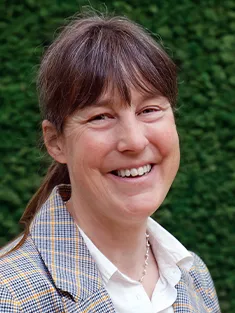Winner: 2022 Award for Exceptional Service
Professor Alison Hulme
University of Edinburgh
For outstanding service to the Royal Society of Chemistry and the organic chemistry community through our member communities and governance groups.

The Hulme group strive to find new and more efficient ways of making complex molecules, based on templates from nature, that have the potential to treat a range of diseases. In recent years, they have also pioneered the use of new Raman imaging techniques that are particularly suited to tracking the location of drugs in live cells. In collaboration with the pharmaceutical industry and clinicians, they are applying these imaging techniques to validating new strategies for cancer treatment and diagnosis. The Hulme group’s interest in natural products has extended into their historical application as dyestuffs. The group has analysed a wide range of objects, from the tapestries at Hampton Court Palace to Subarctic Athapaskan quillwork, gaining valuable information about the production, socio-economic context and display of these objects.
Biography
Professor Alison Hulme obtained her BA in natural sciences from the University of Cambridge in 1989 and stayed there to complete her PhD in the Paterson group. From 1993 to 1995 she undertook a SERC-NATO postdoctoral fellowship at Colorado State University and then held the Hertha-Ayrton Research Fellowship at Girton College, Cambridge. She joined the University of Edinburgh as a lecturer in 1995 and was promoted to Professor of Synthesis and Chemical Biology in 2017. Professor Hulme is a fellow of the Royal Society of Edinburgh, a fellow of the Royal Society of Chemistry and an associate member of the Royal Society of Medicine. She served on the RSC Committee for Accreditation and Validation (2007–12) and as President of the Organic Division from (2016–19). She has worked closely with the RSC on a range of diversity issues. Professor Hulme’s research integrates synthetic methodology development with chemical biology to provide molecular level insight to challenges in biology and medicine. It is funded by the UK research councils, pharmaceutical industry and charities. Her group has had a long-standing interest in the use of metathesis reactions in the synthesis of natural-products like complex molecules and embraced the potential of bioorthogonal reactions at an early stage. With colleagues at the Cancer Research UK Scotland Centre, Professor Hulme is pioneering the application of stimulated Raman scattering (SRS) microscopy to the life sciences and medicine. Professor Hulme has also collaborated with colleagues at National Museums Scotland, Edinburgh, for over 20 years, adapting modern analytical techniques for the analysis of natural and early synthetic historic dyestuffs on a range of objects, to provide greater understanding of the provenance, and socio-economic context of the collections as well as informing policies for their display.
Some people get to explore the world by travelling round it and visiting new places. In my job, I get to explore how it works at a molecular level.
Professor Alison Hulme
Q&A with Professor Alison Hulme
How did you first become interested in chemistry?
My grandpa was a metallurgist with Procter and Gamble and used to bring home samples when he was testing new packaging. He also had scary tales of crawling around inside large production vats to inspect pipework and joints. As a high school biology teacher, my mum would bring home experiments to show us, and whilst the dogfish was very stinky, looking at cheek cells under a microscope was fascinating. However, it was my engaging high school chemistry teachers and amazing experience on the UK team at the International Chemistry Olympiad that persuaded me to study chemistry, and not chemical engineering or biochemistry, at Cambridge University.
What motivates you?
Some people get to explore the world by travelling round it and visiting new places. In my job, I get to explore how it works at a molecular level. Finding a problem and then delving deeper and deeper into the world of chemistry to reach a solution is motivation in itself. Every day the challenges of doing this are different and it is just such an exciting and fascinating thing to do. On top of that, I really enjoy seeing my research co-workers grow and develop as scientists and helping undergraduate students to understand chemistry. Being there for a lightbulb moment is so rewarding.
What advice would you give to a young person considering a career in chemistry?
Chemistry has so many diverse applications it is a springboard for all sorts of careers. Students from my research group have gone on to work in the pharmaceutical industry, fine chemicals, computational modelling, academia, publishing, the research councils, finance, patent law, consultancy, science festivals and even museums and galleries. Having good maths skills definitely helps in understanding many of the basic principles of chemistry. But beyond that you can fine-tune your chemical knowledge to suit your other interests. And if you do decide that chemistry isn’t for you, you will have acquired lots of very useful transferable skills that can be applied in a whole range of other careers.
Why is chemistry important?
I work at the interface between chemistry, biology and medicine. As a chemist, I am able to bring a molecular level understanding to all sorts of biological reactions and interactions. That knowledge can help to bring clarity to the mechanisms of biological pathways and networks, an understanding of drug efficacy and failure, and ideas for new disease treatments. As chemists, we provide a crucial link between disciplines.